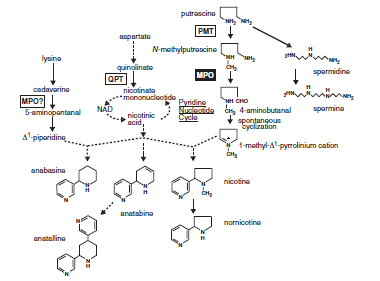Metabolic Engineering in Tobacco Cells
Background
Plant produce numerous secondary metabolites of medical impact. Since these are generated only in specific cell types or tissue, extraction from the natural source, as well as their biotechnological production in fermenters is often not very successful. We follow thereore a biomimetic strategy, where different cell types are coupled to generate a "technical copy of a tissue". In principle, we want to play "metabolic LEGO" to generate different compounds by combination of metabolic modules.
Project Topic
In cooperation with the Institute for Mikrostructure (Group Dr. Guber) we developed a microfluidic Two-Chamber-System and adapted this system for tobacco BY-2 cells. The system is filed for patenting and in frame of the BMBF Programme “New Bio-Economy” we want to test the idea of "metabolic LEGO" together with Phyton Biotech (Ahrensburg). As model for this proof-of-principle we have selected alkaloid metabolism of tobacco, which we want to reengineer such that the cells produce nornicotin, a compound with a recently discovered strong effect against Alzheimer.
Scope of the Study
We were already successful in generating two metabolic modules. The first module overexpresses a key enzyme of early alkaloid synthesis, the second module a cytochrome-P450 enzyme that produces nornicotin. Analysis of alkaloids by HPLC demonstrate that both modules are functional. The problem is, however, that the cells retain the products. In frame of the project we want to test, whether this problem can be overcome by a physical trick: by means of extremely strong (1-30 kV/cm), but extremely short (10-50 ns) electrical fields it is possible to induce in plant cells temporary membrane pores that are resealed within a few minutes. The cells survive this treatment and even continue to divide. We want to test, whether this treatment can stimulate export of the products into the culture medium. These treatments will be performed in the lab of our cooperation partner Dr. Wolfgang Frey at the Institute for High Energy Impulse and Microwave Technology (IHM), the cell biological investigations and the measurement of alkaloids by HPLC will be conducted in the Botanical Institute.
Supervision
Fatemeh Rajabi. contact partner at the IHM: Dr. Christian Gusbeth.
Positions
1 Ph.D. student
Publications
Ziegler J, Facchini PJ (2008) Alkaloid Biosynthesis: Metabolism and Trafficking. Annu Rev Plant Biol 59, 735-769 – pdf

